17 Romeo and Juliet Love Quotes That Stand the Test of Time
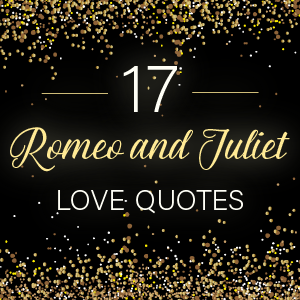
More commonly known simply as Romeo and Juliet, The Tragedy of Romeo and Juliet is one of William Shakespeare’s most famous works. The play follows the lives and deaths of Romeo and Juliet, two young star-crossed lovers from feuding families in Verona.
Romeo and Juliet’s love is one of the most beloved, and tragic, in all of classic literature.
But though it’s possibly the most famous love story ever written, many of its quotes are difficult to remember and hard to place within the larger context of the story. Who said “But loft! What light through yonder window breaks?” Besides Romeo and Juliet, who were some of the other characters who had a large impact on the story? What’s the actual context for these quotes, including the surrounding circumstances of the characters at the time?
With the above in mind, here’s a collection of 17 Romeo and Juliet love quotes that truly stand the test of time.
-
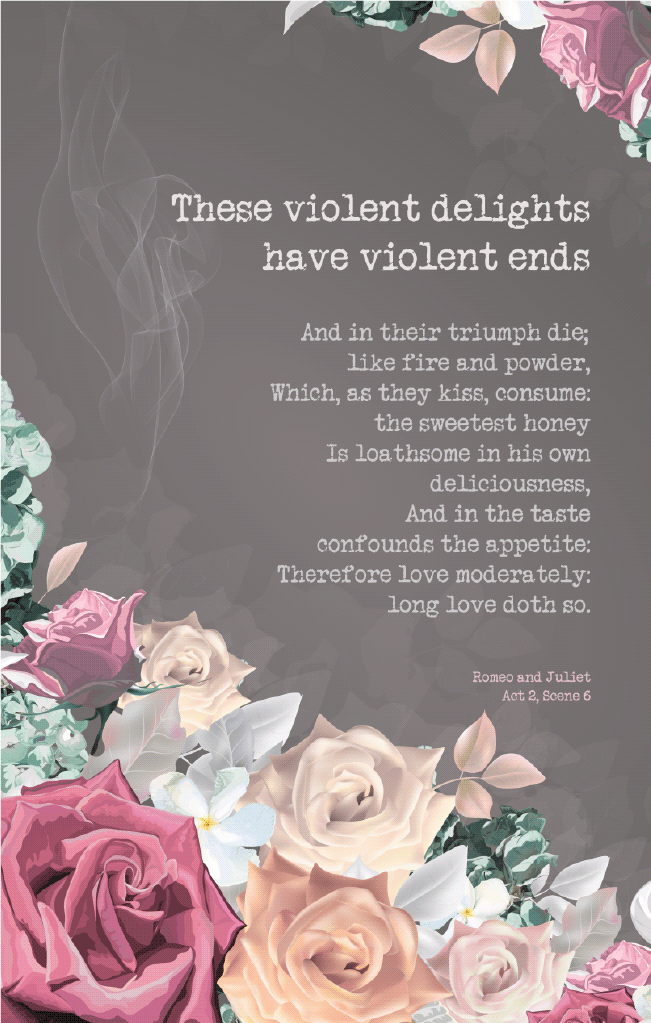 Purchase This Poster
Purchase This PosterThese violent delights have violent ends,
Friar Lawrence (Act 2, Scene 6)
And in their triumph die; like fire and powder,
Which, as they kiss, consume: the sweetest honey
Is loathsome in his own deliciousness,
And in the taste confounds the appetite:
Therefore love moderately: long love doth so.Spoken by Friar Lawrence before he marries Romeo off to Juliet, this short speech counsels the young lover to temper his amorous passions.
In this quote, the friar uses the example of honey, which, although delicious to our taste buds, can cause serious stomach pains if we eat too much too quickly. In the same way, while rushing into a loving relationship is tempting, it’s far wiser to be moderate with our passions if we want a marriage that will endure for a lifetime. While this is all sound advice, we could also read this short sermon as foreshadowing Romeo and Juliet’s “violent ends” that come as a result of their “violent delights.”
It’s interesting that Friar Lawrence is always counseling Romeo and Juliet to love moderately, yet the Friar is a driving force that brings the two lovebirds together (and, some might argue, a major factor in their untimely demise). It is Friar Lawrence who agrees to marry Romeo and Juliet, even though he knows these two lovers only met a few weeks ago. Also, Friar Lawrence is well aware of the fickle nature of Romeo’s affections considering his unrequited love for Rosaline at the start of the play.
Friar Lawrence argues he’s bringing Romeo and Juliet together to help repair relations between the Capulets and Montagues, which it does…once Romeo and Juliet are found dead by family members. Was Friar Lawrence’s decision to marry these two young lovers somehow immoral? Should he have counseled them to wait rather than plunge them into a commitment he knew they weren’t mature enough to handle? These are just a few questions people have to confront when reading Romeo & Juliet.
-
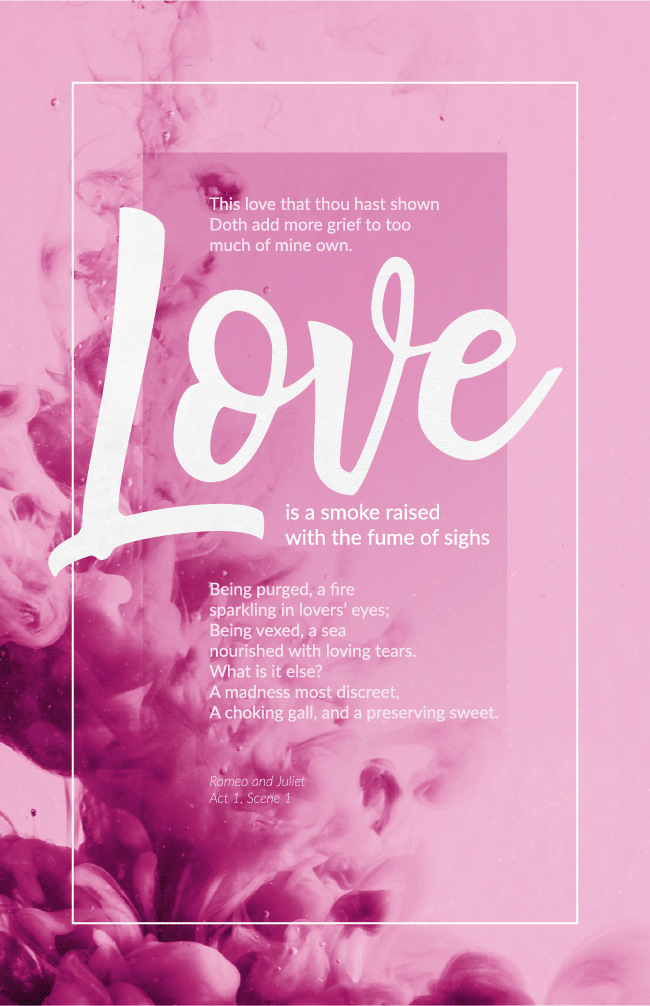 Purchase This Poster
Purchase This PosterThis love that thou hast shown
Romeo (Act 1, Scene 1)
Doth add more grief to too much of mine own.
Love is a smoke raised with the fume of sighs;
Being purged, a fire sparkling in lovers’ eyes;
Being vexed, a sea nourished with loving tears.
What is it else? A madness most discreet,
A choking gall, and a preserving sweet.The “thou” Romeo is referring to in this quote is his cousin Benvolio. At this time in the drama, Romeo is still pretty bummed about his unrequited love for Rosaline. Benvolio expresses his sorrow for his friend’s low state and Romeo responds with this moody monologue.
Instead of feeling better from his friend’s display of compassion, Romeo sees love as an insidious disease that only increases sadness the more we share it. The first set of images Romeo compares love to are related to fire and smoke. Second, Romeo switches to the watery image of the “sea” to describe lovers’ tears. He closes his speech by comparing love to a “discreet” form of madness and, finally, to poisonous bile that tastes “sweet.”
What’s particularly interesting about this speech is the image of the sea. Juliet, of course, will use this same image to describe her love for Romeo in her famous declaration “My bounty is as boundless as the sea.” In Juliet’s quote, however, love is imagined as only increasing positively the more one shares it (i.e. “the more I give to thee,/The more I have, for both are infinite”).
Of course, Romeo’s quote above sees sharing love in the completely opposite way. For Romeo, more love only increases sorrow and grief. He is still seeing love from an extremely egotistical point of view and has yet to learn the higher ideal of love Juliet will come to represent. We’ll explain these concepts in greater detail as we explore some of the quotes from the balcony scene.
One fairer than my love? the all-seeing sun
Romeo (Act 1, Scene 2)
Ne’er saw her match since first the world begun.If you haven’t read Romeo & Juliet before, then you might assume the “my love” Romeo is of speaking of is Juliet. Actually, Romeo is talking to his cousin Benvolio about his love for the fair Rosaline in this quote.
Benvolio is trying to get Romeo’s mind off of Rosaline by suggesting he visit the Capulets’ upcoming ball to “compare” the face of Rosaline with all the other beauties in Verona. Ironically, even though Romeo claims he’ll never find a beauty as fair as Rosaline at this party, that’s exactly what happens when he sets eyes on Juliet.
My only love sprung from my only hate!
Juliet (Act 1, Scene 5)
Too early seen unknown, and known too late!
Prodigious birth of love it is to me,
That I must love a loathed enemy.Juliet gives this speech after she discovers the man she’s fallen head-over-heels in love with is Romeo Montague, the son of her family’s sworn enemy. The theme of fate often comes up in a discussion of Romeo & Juliet. Was it really written in the stars that Romeo and Juliet would meet and fall in love? Is there such a thing as a “soul-mate” or “love at first sight” in real life?
Of course, we know that there would be no conflict to hold readers’ attentions if Juliet and Romeo weren’t passionately in love; however, we have to wonder how genuine their affections are.
In case you were wondering, Juliet is only 13 years old during this tragedy. Although we don’t know Romeo’s age for certain, he is only slightly older than Juliet.
Shakespeare based his play off of Arthur Brooke’s poem “The Tragical History of Romeus and Juliet,” in which Juliet was 16 and Romeus was a tad older. While nobody knows why Shakespeare decided to make Juliet 13, some critics believe it’s because Shakespeare’s daughter Susanna was 13 at the time he was writing this tragedy.
-
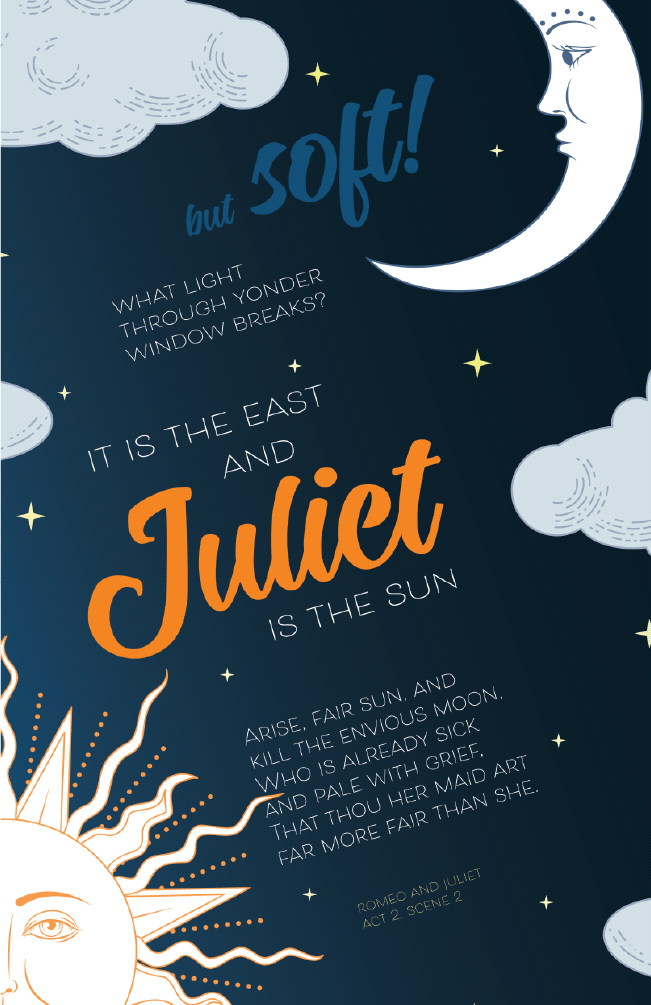 Purchase This Poster
Purchase This PosterBut soft! what light through yonder window breaks?
Romeo (Act 2, Scene 2)
It is the east, and Juliet is the sun!—
Arise, fair sun, and kill the envious moon,
Who is already sick and pale with grief,
That thou her maid art far more fair than she.Even people who’ve never read Romeo & Juliet before know a few quotes from the iconic balcony scene. It’s incredible how emblematic this scene has become in Western culture. In case you didn’t know already, Romeo climbs up Juliet’s house after the Capulets’ party to pronounce his love (and share a few good night kisses) in this classic scene.
Romeo exclaims these famous words as he watches Juliet leave her bedroom chamber to look out at the night sky. The image he chooses to represent Juliet is the sun, which is interesting because the sun is traditionally associated with the masculine in world mythologies. Although we typically associate the sun with the masculine and the moon with the feminine, many ancient religions reversed these roles. Perhaps Shakespeare is using these older associations to make interesting comments on the fungible nature of gender identity.
When thinking about the characterizations in Romeo & Juliet, you could argue that Juliet has more “masculine” qualities than Romeo. For instance, Juliet seems far more determined to make a commitment to Romeo and ensure she won’t get cheated.
For his part, Romeo exhibits a few stereotypically “feminine” traits, especially his moodiness at the start of the play where he shifts from depression to ecstasy within only a few scenes. Perhaps Shakespeare is using these sun/moon images to highlight the fluidity of gender roles? We’ll see many other instances where Shakespeare plays with the sun/moon images below.
-
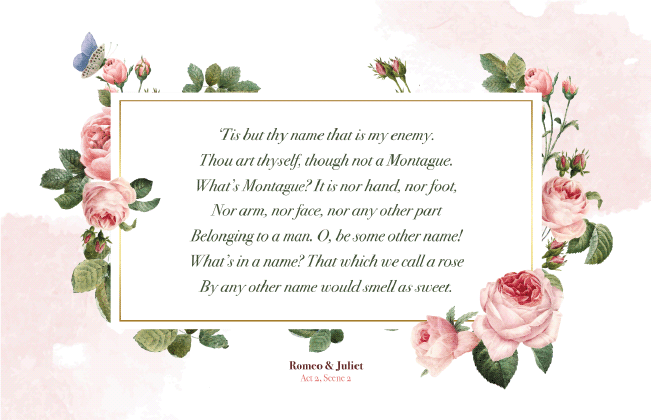 Purchase This Poster
Purchase This Poster‘Tis but thy name that is my enemy.
Juliet (Act 2, Scene 2)
Thou art thyself, though not a Montague.
What’s Montague? it is nor hand, nor foot,
Nor arm, nor face, nor any other part
Belonging to a man. O, be some other name!
What’s in a name? That which we call a rose
By any other name would smell as sweet.In yet another famous quote in the balcony scene, Juliet asks why the name “Montague” should separate Romeo from her. Just because the older generations are embroiled in feuds doesn’t mean the new generation has to take on the conflicts of the past.
A quote from James Joyce’s Ulysses seems apt here: “History…is a nightmare from which I am trying to awake.” Although Romeo and Juliet try mightily to escape the nightmare of their family histories, they still end their days in tragedy.
It’s significant that the root cause of the conflict between the Montagues and Capulets isn’t revealed. The fact that nobody seems to know why they’re embroiled in a bloody feud highlights the absurdity of holding grudges and helps the tragedy’s themes translate well into foreign cultures. This lack of specificity over the Montague-Capulet feud has also kept this play fresh for us moderns by allowing contemporary artists to adapt the structure of Romeo & Juliet in new settings.
Perhaps the most famous examples of artists using Romeo & Juliet’s plot in different settings include the feud between the Grangerfords and Shepherdsons in Mark Twain’s Huckleberry Finn and the feud between the Sharks and the Jets in the musical West Side Story.
See how she leans her cheek
Romeo (Act 2, Scene 2)
upon her hand, O that I were a
glove upon that hand that I
might touch that cheek!Like any young lover, Romeo is impatient to have Juliet all to himself. While in this quote Romeo only says he wants to touch his lover’s cheek, we know from earlier scenes he’d really like to give his newfound love a big smooch on the lips. Indeed, Romeo was so eager to be with Juliet that he started kissing her right after meeting her at the Capulets’ party!
Sadly, Romeo’s impatience and huge emotional swings are tragic flaws that hasten his own destruction. By contrast, Juliet seems more in control of her emotions, especially in this balcony scene. It’s almost as if Romeo has to be educated by Juliet in the ways of a “higher love” beyond the base lustful urges. Despite his obvious immaturity, most readers have great sympathy for Romeo’s plight.
Good night, good night!
Juliet (Act 2, Scene 2)
Parting is such sweet sorrow,
That I shall say good night till it
be morrow.Shakespeare created a many new words in the English language, but one word he most certainly didn’t invent is the adjective “bittersweet.” Interestingly, the world “bittersweet” was initially used as a noun to describe the taste of certain apples in Middle English. Etymologists also believe the Ancient Greeks had a word to describe this unique taste.
It’s unclear when people started using this term to describe emotional states. However, we can be sure Shakespeare’s expression of the sentiment in the above quote is one of the best-known examples in the English language.
I take thee at thy word:
Romeo (Act 2, Scene 2)
Call me but love, and I’ll be new baptiz’d;
Henceforth I never will be Romeo.Religious imagery like baptism can be found in abundance throughout Romeo and Juliet’s courtship. Indeed, in their first meeting at the Capulets’ party, Romeo and Juliet’s conversation forms a full sonnet that deals with the theme of a pilgrimage.
With all these deliberate references to the Christian religion, it’s almost as if love achieves the status of a high religion in Romeo & Juliet. Maybe we should consider Romeo and Juliet the Western world’s most famous martyrs for the cause of romantic love.
O, swear not by the moon, th’ inconstant moon,
Juliet (Act 2, Scene 2)
That monthly changes in her circle orb,
Lest that thy love prove likewise variable.Yet again, we find moon imagery in this famous balcony scene. In this quote, Juliet warns Romeo that she will not put up with him if he is not totally committed to her. Juliet wants Romeo to swear his love by something less “inconstant” than the moon, unless he believes his passions for her are “likewise variable.”
While it’s debatable whether or not Romeo’s affection for Juliet is “variable,” there’s no doubt that Romeo is a moody guy. Much like the moon, Romeo’s emotions shift in almost every scene in this play. Once more Shakespeare is playing around with the “feminine” lunar qualities of Romeo as opposed to the traditionally “masculine” qualities that are more often found in Juliet.
And yet I wish but for the thing I have;
Juliet (Act 2, Scene 2)
My bounty is as boundless as the sea,
My love as deep; the more I give to thee,
The more I have, for both are infinite.Although this quote isn’t as popular as others in the balcony scene, noted Shakespeare critic Harold Bloom believed it holds the key to Romeo & Juliet‘s universal appeal. Well beyond her years in maturity, Juliet reveals her intuitive wisdom in the nature of reciprocal and unselfish love.
Note how similar in sentiment this quote is to the notion of “loving thy neighbor” in the Christian religion. Once again, romantic love seems to be elevated to a semi-divine status in Romeo & Juliet that can lead people to a greater appreciation of the divine mysteries.
Under love’s heavy burden do I sink.
Romeo (Act 1, Scene 4)In this quote from Act I of Romeo & Juliet, Romeo complains that he’s still lovesick over his unrequited love for Rosaline. It’s often shocking to new readers how deeply Romeo is affected by Rosaline at the start of Shakespeare’s great tragedy.
Some literary scholars believe that Romeo had to be “prepared” to embrace the higher love Juliet offers by falling in and out of love with Rosaline. Many readers point out that the imagery used by Romeo as the play progresses gets more advanced as he moves into a relationship with Juliet. Perhaps the experience of loss serves as a crucial learning experience in Romeo’s coming-of-age.
Give me my Romeo; and, when he shall die,
Juliet (Act 3, Scene 2)
Take him and cut him out in little stars,
And he will make the face of heaven so fine
That all the world will be in love with night
And pay no worship to the garish sun.This quote comes from Juliet’s passionate soliloquy at the start of Act 3, Scene 2. Yet again we have sun/moon imagery in this quote. Interestingly, Juliet uses the word “garish,” which is exactly the same word Romeo used in one of his soliloquies in the balcony scene. Instead of using garish to describe the moon, however, Juliet uses this adjective to describe the sun.
While Romeo wanted to cast out the moon in worship of his sun Juliet, Juliet wants to cast out the sun so everyone will worship the nighttime stars in which she casts Romeo’s body. Is Shakespeare again signaling the gender differences between Romeo and Juliet with these deliberate image changes?
-
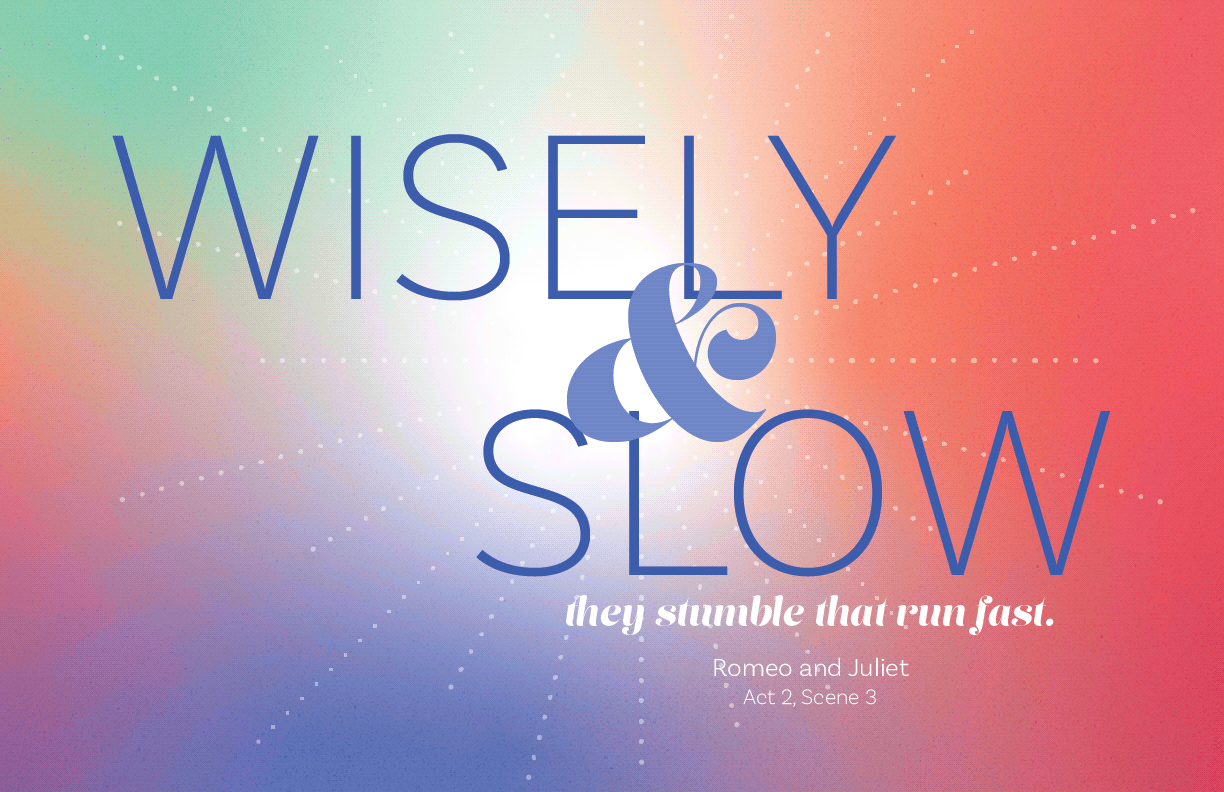 Purchase This Poster
Purchase This PosterWisely and slow; they stumble that run fast.
Friar Lawrence (Act 2, Scene 3)Here’s another quote from Friar Lawrence urging the young lovers to exercise moderation in their relationship. It’s clear that Friar Lawrence values moderation, yet he still agrees to marry the young Romeo to Juliet even though he knows the young man isn’t mature enough.
If you’ve ever seen the 1968 Franco Zeffirelli film version of Romeo & Juliet, then you know that Friar Lawrence literally trips after saying this line. Perhaps the director was signaling the Friar’s unwise haste in marrying Romeo and Juliet with this move.
Eyes, look your last!
Romeo (Act 5, Scene 3)
Arms, take your last embrace! and, lips, O you
The doors of breath, seal with a righteous kiss
A dateless bargain to engrossing death!—
Come, bitter conduct, come, unsavoury guide!
Thou desperate pilot, now at once run on
The dashing rocks thy sea-sick weary bark!
Here’s to my love! [Drinks.]—O true apothecary!
Thy drugs are quick.—Thus with a kiss I die.One interesting pair of opposites that Shakespeare conflates in this and other quotes in Romeo & Juliet is medicine versus poison. Friar Lawrence is the first to bring up this theme when he discusses the strange mixture of medicinal and poisonous qualities in herbs at the start of Act 2, Scene 3. Here too Romeo freely mixes his poison with medicinal “drugs” and an “apothecary.”
Is it ever possible to see poison as a medicine? Believe it or not, this is one of the major themes postmodern theorists used to develop their ideas of deconstruction and the ambiguity embedded in all texts. French postmodernist Jacques Derrida famously pointed out in his essay “Plato’s Pharmacy” that the philosopher Plato often used the word pharmakon in his Socratic dialogues. The interesting thing about pharmakon is that it could refer to both “medicine” or “poison” in Ancient Greek.
Another pair of opposites Shakespeare complicates at the end of Romeo & Juliet is violence versus peace. Romeo and Juliet’s violent deaths were, after all, the only thing that brought the Montagues and Capulets together towards some kind of reconciliation. As is often the case in Shakespeare’s major works, the comfortable lines we often build between concepts like violence/peace and medicine/poison become blurred.
This is thy sheath [stabs herself]; there rest, and let me die.
Juliet (Act 5, Scene 3)Romeo and Juliet reveal themselves to be the opposite of what we’d expect with traditional gender roles in their suicides. While it’s not exclusively masculine to kill oneself by stabbing, it certainly is more violent than taking a poison. Granted, Juliet was going to drink from the bottle of poison Romeo chugged, but she could’ve done nothing, right? Juliet, in a very un-ladylike fashion, commits to death by the sword rather than a live a life without her love.
Juliet is not, of course, the only character in Shakespeare to break gender norms. Both Lady Macbeth and Cleopatra are prime examples of strong “masculine” female roles in Shakespeare’s oeuvre. It’s no wonder feminists and gender theorists have been so fascinated with Shakespeare’s plays in recent years!
A glooming peace this morning with it brings;
Prince (Act 5, Scene 3), speaking the closing words of Romeo & Juliet
The sun for sorrow will not show his head.
Go hence, to have more talk of these sad things;
Some shall be pardon’d, and some punished;
For never was a story of more woe
Than this of Juliet and her Romeo.Thus ends one of Shakespeare’s most popular tragedies. The Prince appears at the start and end of the play to deliver two soliloquies, both in the form of sonnets. Although the Prince only has these two speeches, they are two of the most frequently quoted in Romeo & Juliet. Indeed, the first soliloquy has given us the now common phrase “star-cross’d lovers.”
Shakespeare was, of course, a master of the sonnet form. Throughout his life he composed a total of 154 collected sonnets, not including the sonnets in his dozens of dramas.
Did you know that you can read The Tragedy of Romeo and Juliet for free at Project Gutenberg? You can also read the whole play, love quotes and all, on our full-text Romeo and Juliet poster.
What about you? Did we miss your favorite Romeo and Juliet love quote? If you have any suggestions, let us know in the comments below!


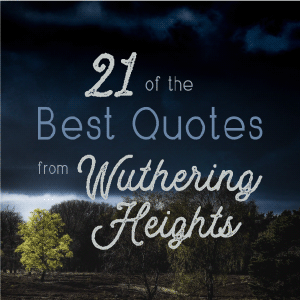
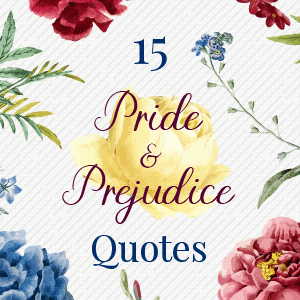
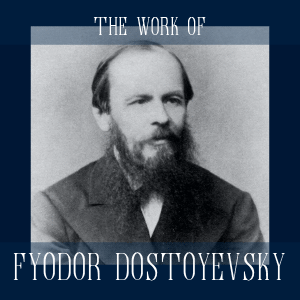
Leave a Reply
20 Comments on "17 Romeo and Juliet Love Quotes That Stand the Test of Time"
romeo and juliet is the best love story i totally inspire this story ,thank you for sharing this blog of love story
Glad you enjoyed the article. Thanks for the comment! ?
Lol it’s literally about all the mistakes they made that caused their deaths though.
Well, what more can you expect from Shakespeare’s most famous tragedy? ?
happiness is finding peace within yourself.
great quotes
thank you for sharing
Glad you enjoyed the article, Shivangi. ?
This is a good article about important quotes
Thanks Kulon!
Wonderful, these are great, especially when your doing something for your English teacher before you leave 9th grade :3
I’m glad our article was helpful. Good luck on your assignment!
thanks andrea, really gonna help during my gcses
Thanks for the comment, Scott. Good luck on your exam!
great quotes really gonna hep with my external exam
Good luck with your external exam, Danelle!
Thank you, Mrs. Schlottman. I am just working on my English assignment, an essay about the theme of love in Romeo and Juliet and this article was very helpful, thank you so much for explaining the quotes too.
Glad our article was helpful. ? I hope all goes well with your assignment!
The interpretation on these poems are pretty impressive! Romeo & Juliet is an absolute classic that should be preserved for today’s generation and for the next. Good job right there!
Glad you enjoyed the article, Francheska!
Thanks. Great way to grab quotes for my pre-reading journals in 9th grade. I picked this one: Wisely and slow; they stumble that run fast.
Friar Lawrence (Act 2, Scene 3)
i am trying to find a quote the represents the loving relationship between Romeo and Juliet for an assignment but none of the quotes i have looked at seem to be just right. very helpful article though!